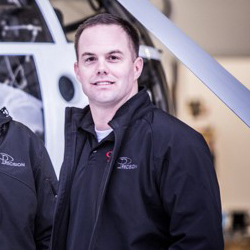To find out what inspires their interest in UAS and attracts the Advisory Board Members to support Drone World Expo, we scheduled a series of exclusive interviews. Our sixth interviewee is Matt Parker, Vice President, Precision Integrated Programs.
Matt has been working in the unmanned aviation industry for 9 years, prior to which he served for 9 years in the U.S. Marine Corps in multiple OCONUS locations and combat deployments. During his tenure working in unmanned aviation, Matt has overseen all facets of UAS service provision for USG and private sector clients, ranging from recruiting to program management to strategic development and advisory services.
Under Matt’s direction, Precision has domestically supported firefighting missions in the Pacific Northwest and focuses on reinvesting funds within Precision’s home state of Oregon through job creation and academic partnerships. He has counselled both private sector and government leaders on matters pertaining to UAS operations feasibility and provided comprehensive implementation recommendations.
Question: Matt, what prompted the move from the Marines into the unmanned aircraft industry? Were you involved with UAVs in the military?
Answer: After nine years in the Marine Corps Infantry it was time to take a step into the civilian world. I was not involved with unmanned systems in the military. When I got out of the Marine Corps I worked for Evergreen, and we were the first services company to buy UAVs and operate them commercially and as a turnkey service. Basically, we made it up – it was Del Smith’s idea, and we made it happen.
Question: UAS Services are a comparatively recent venture for Precision. What percentage of the business do they currently represent and do you see that changing?
Answer: Precision Integrated Programs currently represents roughly 25% of Precision LLC’s business. Our UAS service efforts in the commercial world are paying off and we look forward to our efforts in conservation and maritime security taking off further.
Question: What do you see as being the main areas of growth for commercial applications of UAS?
Answer: Infrastructure and extractive industries.
Question: How do you rate the FAA’s approach to integrating UAS operations into the NAS…? Are they being too cautious?
Answer: They’re not being discerning enough – they need to give the established, proven aviation experts the opportunity to do it first [before hobbyists]. I think that the precedent has already been set that a UAV pilot should have to have a pilot’s license, as now a pilot’s license is required for a COA, so we believe that our Part 135 Certificate should act as a placeholder until the commercial regulations are in place for broader UAS operations. It’s the highest standard of flight operations, maintenance, and training to commercially operate a manned vehicle, so companies wanting to operate unmanned vehicles commercially should be held to the same standards.
Question: There’s been an explosion of interest in exhibitions and conferences about UAS in the USA this year. Why did you choose to support Drone World Expo?
Answer: It’s an opportunity for industry experts to come together on a neutral playing field to accumulate and share industry best practices and move the drone industry forward in a positive and regulated manner.
[UAS Vision is an Official Media Partner for Drone World Expo – Ed.]

